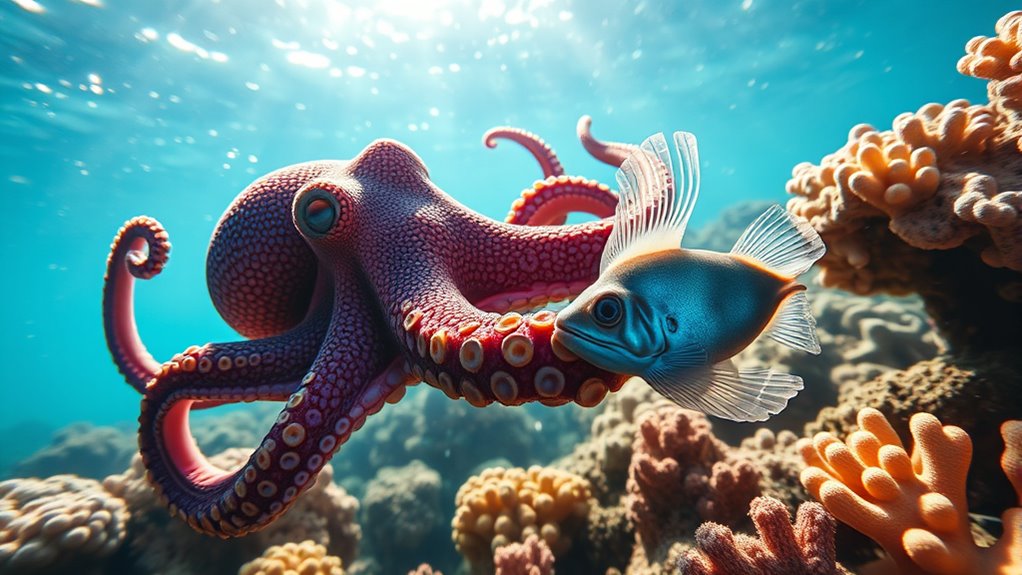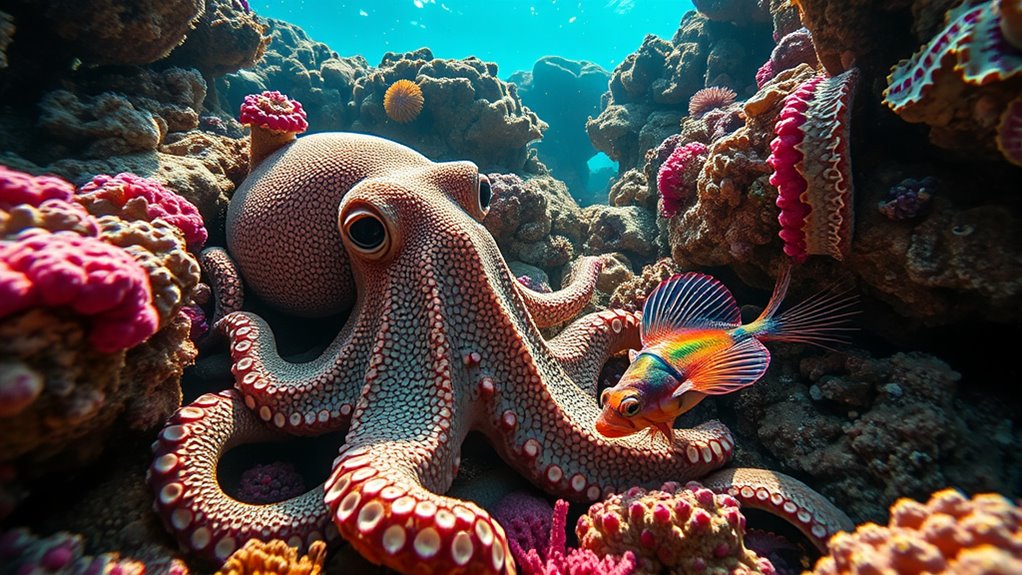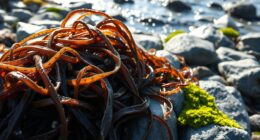As you explore octopus and cuttlefish, consider that their advanced intelligence affects legal and ethical standards globally. Many laws now recognize their capacity to feel pain and stress, requiring humane treatment in research and captivity. Ethical practices emphasize respecting their cognitive abilities and focusing on conservation. Staying aware of evolving regulations helps guarantee responsible actions. If you’re curious about how these complexities influence their protection, you’ll find more insightful details ahead.
Key Takeaways
- Increasing legal protections recognize cephalopods’ advanced cognition, emphasizing humane treatment in research and captivity.
- Laws vary globally but often include specific regulations to minimize suffering during scientific experiments.
- Ethical considerations demand that researchers and industries treat octopuses and cuttlefish with respect reflective of their intelligence.
- Recognizing their sentience influences conservation policies and promotes efforts to safeguard their natural habitats.
- Responsible handling aligns with legal standards and supports animal welfare by acknowledging their complex problem-solving abilities.

Octopuses and cuttlefish are fascinating creatures of the ocean, known for their incredible intelligence and ability to change color. Their remarkable animal cognition allows them to solve problems, escape predators, and even learn from experience, making them standout examples of complex marine life. As you explore their world, it’s important to recognize that their intelligence isn’t just a biological curiosity; it has ethical implications for how we treat them and the ways we include them in scientific research or entertainment. Their cognitive abilities challenge traditional views on sentience and call for a deeper discussion about marine conservation and animal rights.
In recent years, awareness of the intelligence of cephalopods has grown, prompting scientists, policymakers, and conservationists to reconsider how these animals are protected. Because they possess such advanced cognition, many argue that they deserve more careful handling and legal protections, especially when subjected to captivity or experimentation. Marine conservation efforts now increasingly emphasize the importance of safeguarding species like octopuses and cuttlefish, not only because they are essential parts of ocean ecosystems, but because they are sentient beings capable of experiencing pain and stress. Recognizing their animal cognition means understanding that they do not merely exist as biological specimens but as intelligent creatures with complex behaviors and needs. Additionally, their ability to solve problems and adapt to new environments underscores the importance of respecting their cognitive complexity in conservation strategies.
Legal regulations surrounding cephalopods vary around the world, but the growing consensus is that their extraordinary mental capabilities should influence how they are treated in research, aquaculture, and entertainment industries. For example, some countries now include cephalopods under animal welfare laws, requiring humane treatment and minimizing suffering during scientific procedures. These laws are rooted in the understanding that their cognitive abilities are comparable to those of vertebrates, making it ethically necessary to prevent unnecessary harm. If you’re involved in marine research or aquaculture, you should be aware of these evolving legal standards, ensuring that your practices align with ethical considerations and support marine conservation goals.
Frequently Asked Questions
Are Octopuses and Cuttlefish Considered Intelligent in Legal Contexts?
You should know that octopuses and cuttlefish are considered highly intelligent in legal contexts due to cephalopod cognition. Their remarkable problem-solving skills and awareness lead to legal recognition of their sentience in some jurisdictions. This recognition influences laws related to their treatment and conservation. As a result, their intelligence is acknowledged, prompting ethical debates and legal protections based on their advanced cognitive abilities.
How Do International Laws Differ on Cephalopod Welfare?
You should know that international laws on cephalopod welfare are all over the map, with some treaties recognizing their sentience and others leaving them out in the cold. While marine conservation efforts are gaining momentum, many international treaties don’t specifically address cephalopods, leaving a big hole in protections. It’s a case of closing the barn door after the horse has bolted, highlighting the need for updated, unified regulations.
Can Octopuses and Cuttlefish Be Kept as Pets Legally?
You can keep octopuses and cuttlefish as pets legally in some places, but you need to check local laws first. Marine conservation efforts and aquaculture regulations often influence legality, ensuring sustainable practices. Many countries require special permits or adherence to specific standards to protect these intelligent creatures. Always research your area’s regulations and consider ethical implications, including their complex needs and conservation status, before deciding to keep them as pets.
What Are the Ethical Concerns About Consuming Cephalopods?
Imagine you’re a guardian of the ocean’s secrets. When you consume cephalopods, you face ethical concerns like respecting animal rights and minimizing environmental impact. These creatures are highly intelligent and sensitive, prompting questions about their treatment. By eating them, you might unintentionally contribute to threats like overfishing and habitat destruction. So, you need to contemplate whether your choices align with your values regarding compassion and sustainability.
Are There Specific Regulations for Scientific Research Involving These Animals?
You should know that specific regulations for scientific research involving octopuses and cuttlefish often include obtaining aquaculture permits and adhering to research ethics. These permits ensure humane treatment and proper handling, while research ethics guidelines promote welfare and minimize suffering. Always check local laws and institutional policies before starting your research, as regulations vary by country and institution, guaranteeing responsible and ethical scientific practices.
Conclusion
As you ponder the vibrant dance of octopuses and cuttlefish beneath the waves, remember they’re more than just fascinating creatures—they’re sentient beings deserving respect. Their shimmering, shifting forms remind you of nature’s delicate balance. By choosing ethical practices and understanding the laws, you help protect their mesmerizing world. So, next time you encounter these intelligent animals, envision their world of swirling colors and silent intelligence, and commit to preserving their ocean home for generations to come.









